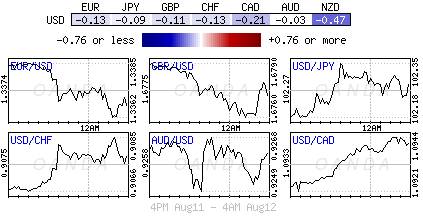Geopolitical concerns are not going away; they are trying to move to the background, while remaining within easy reach. The 18-member single unit has been negatively tied to both weaker corporate earnings and economic data in recent weeks. The morning's European focus has been on German economic sentiment. With Russian actions continuing to weigh on the consumer, German ZEW economic sentiment was expected to be lower, but by how much?
The eighth straight consecutive drop in the German ZEW headline for August is not new or a surprise. However, the size of the drop to 8.6 (previous 27.1, expected 18.2) will have triggered a few alarm bells. This is certainly stronger proof that geopolitical tensions are evidently hitting sentiment. It's worth noting that the ZEW is compiled via a survey of investors and financial institutions and not businesses -- it does not necessarily translate into economic weakness. Nevertheless, investors will remain wary of the lowest level in nearly two years, and coupled with the recent weaker German Ifo index, it would indicate that Germany has started the third quarter on weaker footing.
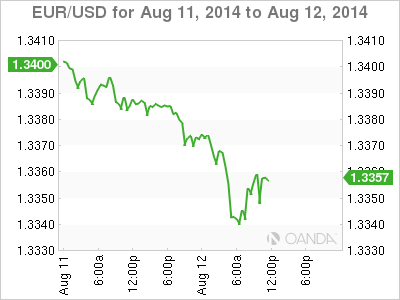
Investors to See German GDP
What the market needs to gauge now is how much of the weaker German headline has already been priced in? The initial impact on the single unit has caused it to make an assault on the last week's nine-month low (€1.3333). The self-contained trading ranges make dynamic pricing much harder to gauge. Investors would be better off looking to Thursday's second-quarter gross domestic product figures for stronger conviction -- Germany is expected to have stagnated or even contracted a bit. The EUR in the short term has a lot of wood to chop through with strong corporate bids scattered ahead of €1.3325-3300 option barriers. A +2B €1.3340-50 EUR option that expires later this morning should help to contain the single unit in the short term, and may even help to squeeze the EUR higher on the back of some nervous shorts. However, a daily close below €1.3389 will be a blow to the EUR bulls who have positioned themselves with contrarian positions on the back of recent record 'long' USD reports.
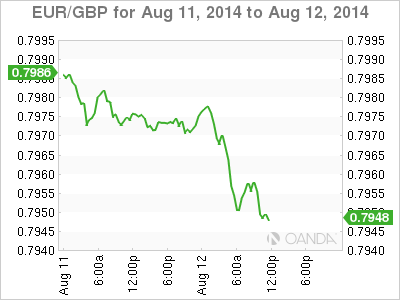
Investors Wary of German Bund Supply
For some further insight, the EUR bear should continue to watch Bunds and the Bund/Treasury spreads for clues. The Bund 'bull' has been in fine form of late, pushing 10-year yields to record lows (+1.02%). With this morning's disappointing headline, the market would be looking to make additional progress back toward record high prices; however, advancement could be difficult with dealers wary of tomorrow's 10-year Bund supply coming to market. All dealers will want to make room to take down the issue, which look rich on the curve and would back-up yields. A depressed yield environment coupled with the thinly populated state of the markets could make for a messy issue.
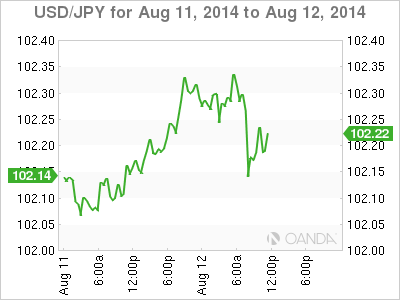
The rapidly shifting market positions, mostly favoring the dollar, are just one factor behind why volatility may be ready to increase in the forex market. While many have added to their short-EUR positions outright (August 5 Commitment of Traders report), they have also made bets that the 'mighty' buck would advance against the JPY, GBP, CHF and Australian and Canadian dollars. This has led to the largest grouping of long-USD positions in 12 months. Risk aversion and Treasury buying have been driving the dollar's rally. Throw into the mix poorer global growth prospects, and collectively it probably justifies the dollar’s medium-term support. However, with sometimes-questionable liquidity, due to the European holiday season in full swing, those holding the weaker dollar longs are hoping not to be squeezed. Expect them to live with short-term consolidation as they pin their hopes on global growth prospects continuing to underwhelm.
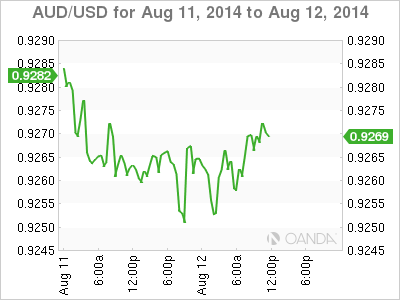
Aussie 'Longs' Not Dead Yet
The AUD ($0.9250) is not dead and buried yet. The currency has been a favorite member of the highly coveted carry trade, financed mostly in EURs: a trade made popular in a low-rate, less volatile trading environment. Despite direct 'jawboning' from the Reserve Bank of Australia's (RBA) Governor Glenn Stevens, the AUD is finding it difficult to go down. However, when central bank monetary policy eventually begins to tighten, one should expect the long-AUD carry position to come under more pressure. With Aussie stocks rallying overnight (S&P/ASX 200 +1.3%) despite lower trade volumes on the back of geopolitical concerns, and in light of stronger business data for July and upbeat house price growth, it will make it difficult for the RBA to cut rates anytime soon. The speculator is 'short' the AUD, or rather 'long' the USD, and the currency's demise will only be a grind.